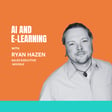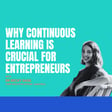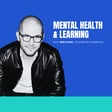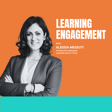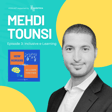Become a Creator today!Start creating today - Share your story with the world!
Start for free
00:00:00
00:00:01

Community & Learning - which comes first?
When looking to create a learning community it is often a chicken & egg question - if you build an e-learning space will people come? Or should you already have the people and build the content around them?
Featuring Jill Nicholson of the mesa.
Transcript
Learning Arabic During Lockdown
00:00:00
Speaker
Like many people during lockdown, I finally committed to learning something new that I had been procrastinating for some time, a new language. And that language was Arabic. I struggled through to level two only to find myself lost and disconnected. I did something I've never done in my entire life of learning and repeated the course. I was so glad I did while everyone else moved on to a different level.
00:00:29
Speaker
I stayed and had new classmates join me. Those new classmates became my core learning group as time went on and schedules changed. All three of us are still taking classes together today. Thinking about it now, I can't discern which came first for me, the desire to learn the language that kept me going or the community we built around it.
Introduction to 'How Humans E-Learn' and Guest Speaker
00:00:53
Speaker
I'm Lauren Anders-Brown, your host for this episode, and we're going to explore more about this topic with our guest speaker, Jill Nicholson. You're listening to How Humans E-Learn, discussing the impact human-connected interactive experiences have on the human capacity to learn.
00:01:11
Speaker
This is a podcast for trainers, educators, learning and development professionals, coaches and mentors, the education technology community, and anyone who wants to leverage new ways to reach lifelong learners and to look at what others in the e-learning industry are doing to make that happen.
00:01:32
Speaker
When creating any curriculum, it's often a chicken and egg question, or if you build an e-learning program, the people will follow. Or is it best to find those people first and build the program around them? With me today, I have Jill Nicholson who's going to help me learn if there's an answer to this age-old question. Hi Jill. Hi Lauren. Jill began her career in learning as a teacher.
00:01:59
Speaker
I think in teaching, there's so many pride moments. And I think a lot of people just assume it's results day, because that's sadly often how you're measured and what you're judged against. But I definitely think it's more about that journey that you have with your students. And like you say, just kind of seeing them be able to kind of really grasp the concept for the first time or, you know, to think about
00:02:21
Speaker
more details, kind of worldly skills and being able to kind of critique and analyze. So not just kind of recall. So certainly when they start questioning things, I always got really happy just in terms of being like, yeah, they're not just accepting the status quo.
Mesa: Tech for Good Startup
00:02:36
Speaker
She then moved into the humanitarian sector and now is the head of community at Mesa. Jill, could you introduce us to Mesa?
00:02:45
Speaker
Yeah, absolutely. So the Mesa is a tech for good kind of innovative startup. So we were incubated out of IG advisors and the Mesa was created to find sort of new and innovative ways to maximize the potential of donor giving. So donors can achieve greater social impact to support the most underserved populations and causes. So we very much sit at that intersectionality of philanthropy, community building and digital innovation.
00:03:14
Speaker
And we really focus on bringing and harnessing community building approaches into the philanthropy world to help philanthropic communities and their donors connect, grow and give better. We do this twofold. And so we've got both bespoke community platform, which was designed
00:03:34
Speaker
for communities of donors and funders. And as tech is not an ended itself, we work with our partners to incorporate the best community building practices and contextualize for the philanthropic sector to really create inclusive and engaging communities that connect donors and inform their programming. And just thinking about driving thoughtful and informed action.
Digital vs. In-Person Communities
00:03:57
Speaker
So your workload's pretty small, right? Sounds like you don't really do much.
00:04:02
Speaker
Yeah, I've got loads of spare time actually to do podcasts. No, I mean, I think if anyone has ever donated or considered giving to a philanthropic organization or charity, I mean, we always wonder kind of where our money goes and how it's used and the impact and programming that's having in your work sounds.
00:04:22
Speaker
Like, you like to answer those questions. I mean, we're certainly working with donor networks who are working with sort of high net worth, high net worth, sorry, ultra high net worth individuals. And so really thinking about how to leverage, you know, not just more giving, but better giving. So, you know, thinking about what their philanthropic practices look like. And a lot of these donors are already having a lot of these conversations, you know, times are changing.
00:04:50
Speaker
The way that giving is done is certainly changing from how it was done previously. You know, there's a lot more about trust-based philanthropy, about unrestricted funding. So there's a lot of evolution in the space. And by adding that community approach, we're really adding a really nice peer dimension for these organizations to be, or individuals, to be able to navigate their way through this.
00:05:12
Speaker
rather than just relying on, you know, one way sharing as it were from the philanthropic communities that they're kind of doing their networks that they're already a part of. So it's a really exciting time in philanthropy and certainly having a background as well in the charity sector. I just know how important philanthropic money can be, particularly for innovation. And so it's really nice to be a part of that side of it as well.
Trust and Collaboration in Community Building
00:05:34
Speaker
So Jill, in your experience, what are the most effective ways to build community?
00:05:39
Speaker
Oh, absolutely. I'm a soundbite on this. And so anyone that's ever spoken to me about this, here's the same things over and over again. Trust is the number one community building principle. People need to feel safe. That's psychologically, emotionally, maybe even physically, you know, before they will start engaging. And it's very, it's difficult to build trust. It's quite active. You know, it has to be reaffirmed. You constantly have to do it. You're adding in new people.
00:06:06
Speaker
and so that is my number one community building principle. I think a close second, you build with and not for. So you may have an objective and you absolutely will and an agenda for creating this but if your members don't feel the value to them they won't come back. We often see scope creep of business agendas in communities in general and then
00:06:30
Speaker
The question is why are members disengaging, but they don't feel their needs are being met. So it's certainly that kind of co-creation exercise that are going into it. I think as well, community is very human. You can't and you won't know it all, so you have to really lean into that. You are constantly iterating, you're developing, you need that freedom to learn. You need to pilot. Not everything will stick. Things will run their time. That's okay. Not everything's scalable.
00:07:00
Speaker
And so those are the kind of things that I like to build my community based on, and just working from those kind of key principles and building up from there. They're all very human, you know, at the base and the core of them, I think maybe sometimes we just forget that as humans as to kind of go back to the basics, right?
00:07:19
Speaker
Absolutely. And I always talk about Back to Basics because I think they can so easily be forgotten as technology becomes sexier or new playbooks and things like that come out. But really, sometimes you just need to go back to people and be like, I'm a bit stuck. How do we want to achieve this together? Everyone is part of that community. They don't necessarily see themselves as individuals. And being a bit vulnerable, particularly as a community leader, definitely
00:07:45
Speaker
It can make people feel that you are human, that you can be trusted. All of those bits and pieces, just in the same way as we interact in our everyday lives as well. That's a really good turning point for
Technology's Role in Connecting Communities
00:07:57
Speaker
my next question. Let's bring technology into the question. Does it matter if these communities are online or in real life?
00:08:03
Speaker
I think each has a very real role to play. And I think online and digital and physical play into each other. I really think it's a continuous cycle where they support each other. And I think they actually play slightly different roles and they certainly offer different opportunities, I would say, for engagement.
00:08:26
Speaker
So I'm a big believer in the digital space for democratizing access in a world that's increasingly globalized. This is a really real and valid role, I would say, to play.
00:08:39
Speaker
But you can't then play the power of in-person interactions. And I think particularly in that kind of post-COVID world that we're in, where people are sort of re-navigating and they really, you know, we didn't have in-person interaction for such a long time that people are thirsty for it. But I think...
00:08:59
Speaker
In person alone, it's less frequent, it's more costly, and it definitely leaves gaps where digital can support. I think great examples of this is around big events or conferences.
00:09:14
Speaker
I personally think there's nothing more frustrating when you leave a conference, you know, you've just started to unpack some really big meaty topics. You've really been in the zone and you leave, but you know, you're not necessarily connected to those people. You may frantically have been trying to get LinkedIn profiles, but then
00:09:31
Speaker
you're restarting a conversation is kind of on a one-to-one basis. So having a digital space where you can seamlessly flow and transition, those big topics, those big conversations, and just continue that conversation. It's just such a great way of showcasing how they can interface with each other. I think it's less about seeing them as competing spaces, but more about how we can join them together, how they do support each other in many ways.
00:09:59
Speaker
and using them to support your wider agenda as one rather than thinking of them as separate. So I think technology absolutely has a role to play. Community platforms are huge now that lots of people use them. There's lots of other ways people can build. People build Slack communities. There's LinkedIn groups.
00:10:22
Speaker
people might even turn to things like WhatsApp groups. Each of them have pros and cons to them. But certainly being able to just flow and have those spaces available, I think it's really supportive for in person. Absolutely. And definitely for online as well. I know that I've attended some online conferences and
00:10:42
Speaker
I'm just the same as being in person. I'm, like you said, adding those people on LinkedIn. Then I have to try and remember what I added them from or why we connected. So at times it's easier if there's already kind of one easy way to kind of connect the community and then you remember kind of exactly how you interacted or where they came from because LinkedIn communities end up just keep growing and growing and it's hard to keep track of people, isn't it?
00:11:08
Speaker
Yeah, absolutely. And I mean, Slack communities have become a bit, you know, there's people been talking recently, they've been a bit disenchanted with Slack. And the problem is, lots of people have communities on Slack as well, if people are leaving the platform, they're leaving all of those communities. I think there's definitely
00:11:23
Speaker
you know, it can be difficult in just the ways that you get notified and certainly different people's preferences of engagement as well. But I think certainly when there's really tailored spaces, you know, and different, you know, follow on groups that are arising from maybe, you know, round tables that have happened or, you know, even people that people weren't necessarily part of those round tables who can jump in and join in the conversation.
00:11:47
Speaker
Because, you know, there's always that thing at conferences as well where there's multiple competing sessions or things that you want to attend and you can't spread yourself out in that sense on the day. But certainly online, you can access that afterwards and you can engage that way. And I'm going to be a little controversial here because I know we talk a lot about human connection. But do you think people can retain and learn on their own or do they have to have a community?
Community Learning vs. Independent Learning
00:12:19
Speaker
So humans are social beings. So I do think we can learn in isolation. I mean, there are certainly things, we do social learning on an everyday basis. I mean, whether we recognize it or not, there's things that we are picking up. But I definitely think to consolidate and to connect to that learning, I think that's where adopting a community approach is much more powerful.
00:12:42
Speaker
So I think just thinking about the learning pyramid in general and shifting from passive to active learning, that engagement component is incredibly powerful. As humans, we typically forget 90% of what we process in a month. We need that kind of practice for permanence, as it were.
00:13:00
Speaker
And I think having that community around us, we can interrogate, we can share reflections, we can situationalise what are potentially quite conceptual theory into tangible practice. I do think it's quite an overlooked
00:13:20
Speaker
part of learning and I think it's often an add-on rather than an integration to the foundations of learning practice. And I think it's a real missed opportunity just in terms of the way that actually brain, if you look at brain science and the way that we engage, so like transactional learning to actually supporting someone else to understand the concept will really consolidate it for us. So yes, we can learn independently how much we actively take on
00:13:48
Speaker
and retain of that is a different question. Just like in the same way that you were talking about learning a language, if you learn a language and you don't practice it or you don't utilise it, then you know over time you will lose the capacity, you're not immersed in it. Whereas if you are within a group that are learning languages and you're speaking it, that will consolidate your practice and it's the same for other types of learning as well.
00:14:13
Speaker
And following on from that, do you feel as a society, we value learning from each other enough, or is the only thing that matters how we learn individually in achievements, like degrees or qualifications, like how can, and how can we change either outcome?
The Value of Informal Learning
00:14:32
Speaker
Yeah, I definitely think there's still room to grow in this. I think there is a real reliance on quite traditional and what I would class as transactional learning that can be accredited in some kind of way. But I do think there's a movement coming. And I think actually even maybe potentially stemming from social media on the way that information is now shared.
00:14:51
Speaker
You know, there's lots of stats and studies around you, particularly young people engaging with, you know, how they are learning through TikTok and, you know, you've got kind of influencers who are actually educators and bits and pieces like that. I would personally love to see informal learning grow in recognition, as I really think.
00:15:09
Speaker
You know, it deserves the validation as the valuable approach that it is. But I think in terms of just that wider base of how people are, how learning is assessed, I would say.
00:15:26
Speaker
It is more reliant on quite traditional qualifications, which often are rope learning in a sense, because it's just recall. It's not all of those kind of interrogation principles or, you know, all of those actual tangible skills that we use kind of in everyday society. Like it's interesting as, you know, as a former educator, we often do lots of individual work, but actually when you come into the workplace,
00:15:52
Speaker
a lot of what you do is cooperative and the collaborative work and teamwork and we don't necessarily provide those skills and for interaction and for critical analysis in the same way that we actually apply them into the world today.
00:16:09
Speaker
So we've done a lot of talking about the advantages of community building. Do you have any success stories that you might be able to share that could really kind of convince anyone who ever thought they could learn anything on their own that maybe they should find a community?
Success Story from Mesa's Digital Community
00:16:23
Speaker
Yeah, absolutely. I mean, I currently run my own community through the Mesa called Collective, and that's made up of donor networks and the sort of people who are engaging within Collective are really
00:16:35
Speaker
engagers within their organizations. So they don't necessarily identify as being community professionals, but they engage with their donor networks members on a daily basis, you know, they're very high touch interactional, they've got, you know, really great human skills.
00:16:52
Speaker
But collective is fully remote, so it's a completely digital community because we're global, right? And when we were first doing our initial pilot, I think the members were actually surprised at the value it brought to them because in their day to day, they often hear that in person is much more valued.
00:17:10
Speaker
And I mean, I can go off on tangents forever, but I do think people have not necessarily always had the best of digital experiences. And I think, you know, as we saw through COVID, lots of things were thrown together very rapidly that weren't necessarily quality as people tried to pivot very quickly. But I think things are definitely progressing and hybrid's another area, which is certainly getting more attention now.
00:17:32
Speaker
But I think particularly for a collective, just the relationships that they've built in a very short space of time, the problems that they've shared and solved, and just it's breaking down silos. So these are organizations who all work in the same space. They might have members who go across multiple organizations, but they don't necessarily would engage with each other on a regular basis. And I think in terms of just the tangible things that it brings them, you know, it reduces
00:18:01
Speaker
duplicity of time, effort and resources because they share their challenges and their successes. You know, it's that kind of place of ideation and inspiration and it's a very honest space where people can bring their whole selves and kind of whatever is for going on for them in that moment. So although potentially there might be a world where these organizations are seeing as soon as competitors and that's not within this space. They're really kind of there to
00:18:29
Speaker
give and to take from the community to enhance their own practice and the work that they're doing in a really tangible way. And I think it's just been such a lovely learning experience for them and just some of the feedback that was coming out of it, just how they could build that and replicate it. Because certainly, you know, people were cautious about digital, you know, we heard their apprehensions before we went into initially to pilot and now it's a fully fledged community, just about well, kind of what their expectations were and
00:18:58
Speaker
how they thought it might be able to benefit them and just to see them you know grow within it and actually be part of it and give time to it you know it's really nice to see as a community builder how they've managed to kind of counteract maybe some of their initial expectations through their participation.
Pitfalls in Community Building
00:19:18
Speaker
So have you ever seen a digital community fail?
00:19:23
Speaker
Yeah, sadly. I mean, it happens. The problem about community, and this isn't specific just to digital communities, but there is that mentality of if we build, they will come. And community, it's not that you need a single spark to start the fire. You know, they need to continue.
00:19:42
Speaker
And inputs, they need work, you know, it's people powered. It's like we were talking about the beginning, those principles of community building, if they're starting to be eroded, then the community starts to break down. And certainly just for different reasons in terms of, you know, either they go through exponential growth, and they really lose their kind of root cause.
00:20:03
Speaker
or there's just not enough time and energy invested into sustaining them. And, you know, people get very frustrated around particularly digital communities because you can often put a lot out there and it doesn't feel like you're getting a lot back, but there are people engaging with your content and they might be reading it, they might just not necessarily be actively responding to it. And so I think definitely in that way.
00:20:28
Speaker
and people can kind of have misconceptions about what that community building journey and sustainability plan would look like and I think people often think sustainability comes very quickly and you know you put in the upfront effort and then the kind of community members will take it forward and absolutely in some instances that that could be the case I think that's much rarer and I think you just always need to
00:20:54
Speaker
really think about the resourcing from your side as the community owners and managers just to ensure it's the space, you know, ensure it's meeting people's needs, ensure it's adapting and changing as people's needs change and move forward. So Jill, for anyone who's listening to this podcast and who's looking to start their own
00:21:15
Speaker
e-learning community, what are three things that you would take from your own experience to help inspire them?
Integrating Community in E-Learning
00:21:28
Speaker
Absolutely. I think build it from outset, like build it into your plan. Don't try it. I mean, ultimately, if you want to create it as you go, you absolutely can. But I think if you've got it rooted from the complete outset, it's more likely to be successful if you're managing people's expectations, if you're bringing them on early, if you're really framing that for them.
00:21:51
Speaker
And then I think that can be really helpful for putting it center rather than at the side or off the side of everyone's desk. I think just framing how you want people to engage. You know, what is the expectation?
00:22:06
Speaker
you know really integrating it into your approach so it's not like oh we're going to do this here and then there's a digital space there you know how can you weave that bond between the two of these spaces so you can have that conversation continued so it feels fluid so it doesn't feel like
00:22:24
Speaker
is kind of additional at the site as it were and I think perseverance. I think there is an emotional side to community building as well because it can feel very personal if you put something out there and you don't get much traction back. I think definitely thinking just people might really be engaging behind the scenes but they don't necessarily aren't ready to
00:22:47
Speaker
comment on things they don't think they've got anything to add to anything at that time, but they're processing and they're taking what you say. So I think just not taking things personally when there's tumbleweeds, because there will be tumbleweeds. I can almost guarantee you that in terms of some things. But just certainly
00:23:07
Speaker
relying on the other community members as well, just pulling them in, just always going back to them and asking them, like just those back to basics principles, you know, checking in, just making sure they're seeing themselves in it. Is this what they want? You know,
00:23:20
Speaker
how could it change and adapt? Just those kind of things, I think are the kind of top three things to set expectations beforehand. I think a big part of my job is, you know, tech is not an end in itself. And I often find myself saying that, you know, because it is that we build and there will come mentality. And I think just really knowing what you're trying to achieve from it and managing expectations on your side as well will help you set yourself up for success.
00:23:48
Speaker
rather than overestimating what you are going to be able to achieve with the resources that you put in as well. So I think you might agree that bigger isn't always better.
00:24:02
Speaker
Absolutely. I mean, bigger can be such a validity metric. If you've got 100 people in your community, but you've only got, you know, five people actively engaging, you know, I think you need to ask the questions about what you're trying to achieve in terms of are you trying to exponentially grow? Is that the number that you're trying to hit? And often that is a
00:24:24
Speaker
a metric that communities are measured their success by. We've got 7,000 registered members, but actually if you look at the data behind it, there's only actually a couple of hundred that might be engaging at all. And so just really thinking about that, I think often communities when they start to grow on a huge scale, they can feel less intimate,
00:24:44
Speaker
people's voices can feel like they're getting a little bit more lost. And each community is different, so you have to really think about, you know, what it is in relation to your community, your specific area and what you're trying to achieve. But that intimacy, too few, and it can feel quite quiet, too many, and it can feel potentially just
00:25:03
Speaker
a bit overwhelming and too buzzy. So just thinking about how you can disaggregate and you can potentially provide other groupings within that as well. But certainly steering away just for numbers, for numbers sake.
Subject vs. Learning Community: What's More Important?
00:25:16
Speaker
Final question and I have to ask it. Yeah. It's the chicken and egg question. What do you feel needs to come first? What you learn or who you learn it with? This is so hard. And it's hard on so many levels. Okay.
00:25:33
Speaker
Okay, I've got many thoughts on this. So I think there's things that I know that I would want to learn. So like taking MOOCs, for example. So thinking about wanting to do a course, but wanting that kind of accountability mechanism to it.
00:25:55
Speaker
a great way to achieve in kind of that situation is to build the community around you first. So being like, I know I'm not going to be able to do this on my own because it's difficult to start in the time, be difficult to allocate. So then collecting it. But then there's also learning where, you know, you're not going to be able to attract anyone to it for
00:26:13
Speaker
potentially cost barriers or whatever, or thematic areas not of interest, and then the community that lies within the cohort that you're potentially with, in terms of assigned with, with the formalized training.
00:26:27
Speaker
I'm going to structure these thoughts a bit. So I find independent learning challenging. So I can absolutely learn independently, but like we were talking about earlier, just that consolidation of learning for me comes from that sharing, that discussion afterwards, that kind of processing and debating. And that's really easier to do with people who are in that same headspace as you.
00:26:49
Speaker
So you can absolutely have those conversations with people who are not doing that type of learning with you, but, you know, they're potentially lay in that subject area. And there's definitely value in that as well. Again, going back to our lovely learning triangle and helping you move along your learning journey, but just being able to
00:27:08
Speaker
engage with people who are in exactly the same kind of maybe mindset headspace as you on that learning. I just find so valuable for me to really think about how to take forward my learning. And I think that comes from a couple of places. One, because in formalized learning settings, we don't always think about that action plan setting.
00:27:33
Speaker
It can very much be conceptual theory and then people are left trainings to really think about how they take that forward themselves and that can feel very big and very scary sometimes and that having that support network around you to kind of interrogate that and break that down can be really helpful. But I think as well having that community around you keeps you in that mindset of learning.
00:27:57
Speaker
And I think if we're talking about potentially either in-person courses or courses that you allocate a certain amount of time to a week, whether that, you know, if that's digital or not, when you're out of that formal space, you're kind of heads out of the game a little bit. So having that kind of peer community is that nice balance of not being so formalized, but still being able to engage with people that are in that moment in time thinking like you are thinking for as well.
00:28:26
Speaker
And kind of, as I mentioned, just that accountability mechanisms. So I think learning in cohorts makes people step up. I think independent learning, you have to be so dedicated and motivated to see things through. And I think, you know, in terms of MOOCs, like the drop off rate is exponential. But I mean, I don't believe the completion rate of a MOOC is a sign of success. And I think, you know,
00:28:49
Speaker
lots of people will take lots from learning and might not need to complete learning, whether that's MOOC or whether that's a course of any form. However, having people around you makes you feel more dedicated to your learning. So I'm a coach as well, and I definitely see my coaches using our sessions as that kind of accountability mechanism. And it's those same principles. Having a community cohort around you
00:29:13
Speaker
they become your accountability buddies and they push you forward because you feel like you are committing to them in some way. You might be doing things together or you might join for meetings and you might have actions to complete in between those sessions as well. So I don't know if I've answered your question yet.
00:29:34
Speaker
I think you have. It kind of reminded me of back in university when I was at school in Massachusetts.
00:29:45
Speaker
In the US system, we have prerequisite courses that you have to take for any kind of general degree. Generally, when you would choose the things that you really didn't like the most, you would choose to do it with the people you liked the most because it would kind of get you through it. It didn't matter what you were learning. It was the fact that you had someone that you knew that you were learning with that you could hold each other accountable for and kind of get through it.
00:30:10
Speaker
Yeah, absolutely. I completely agree. And I think sometimes you can't always choose the people in that sense, but it might be that you then just create that community with who you're with. So I definitely think who you learn with is just so important for the learning outcomes moving forward.
00:30:30
Speaker
Absolutely. So I think it's the who and not the what, if I had to take anything away from your chicken and egg question. Yeah, I'm going to go with it. I might take the edge, but I'm going to go with it just now. Well, if you'd like to get in touch with us regarding today's episode, previous episodes, or anything else, you can send me an email, Lauren at Gamoteca.com. That's all for this episode on how humans e-learn together, supported by Gamoteca. And until next time,
